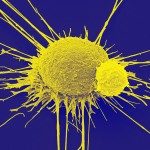Lien vers Pubmed [PMID] – 8102239
AIDS Res. Hum. Retroviruses 1993 Jun;9(6):553-63
One of the difficulties in understanding the complex pathology of human immunodeficiency virus (HIV) infection is to explain the progressive depletion of the CD4 helper T cell population and consequently the destruction of the immune system. Although cytopathic effects of HIV are observed in vitro, they cannot in vivo account for CD4 T cell depletion because relatively few cells are productively infected. Thus immunological mechanisms must be envisaged. We have found that peripheral blood lymphocytes (PBLs) from asymptomatic HIV-infected individuals are primed for a suicide process known as apoptosis or programmed cell death (PCD). DNA fragmentation characteristic of apoptosis was enhanced by stimulation of lymphocytes with ionomycin, a known inducer of apoptosis in suitably primed cells. Identification of the T cell subpopulations programmed for apoptosis indicated that both CD4+ and CD8+ cells died when cultured without stimulation or when polyclonally stimulated with ionomycin. Activation-induced cell death was also observed after stimulation with self-MHC class II-dependent superantigens, namely bacterial toxins from Staphylococcus (SEB), Streptococcus (ETA), and Myocoplasma (MAM) and under these conditions the CD4+ T cells were preferentially affected. To explore whether new macromolecular synthesis were required for apoptosis, various known inhibitors of apoptosis such as cycloheximide, cyclosporin A, Zn2+, or EGTA were tested. Activation-induced apoptosis was found sensitive to these inhibitors, indicating an active mechanism, but apoptosis observed in nonstimulated cultures was not, suggesting that these cells already contained the complete machinery for death. Prevention of apoptosis could be obtained in the presence of a mixture of cytokines and the minimal signal necessary for this prevention was IL-1 alpha and IL-2. Finally, a correlation between PCD and AIDS-pathogenesis was suggested by the comparison of lymphocytes from lentivirus-infected primates suceptible (SIV-infected macaques) and resistant (HIV-infected chimpanzees) to AIDS. Altogether our results suggest that, during HIV or SIV infection, PCD may contribute in vivo to the deletion of reactive T cells after antigenic stimulation.


